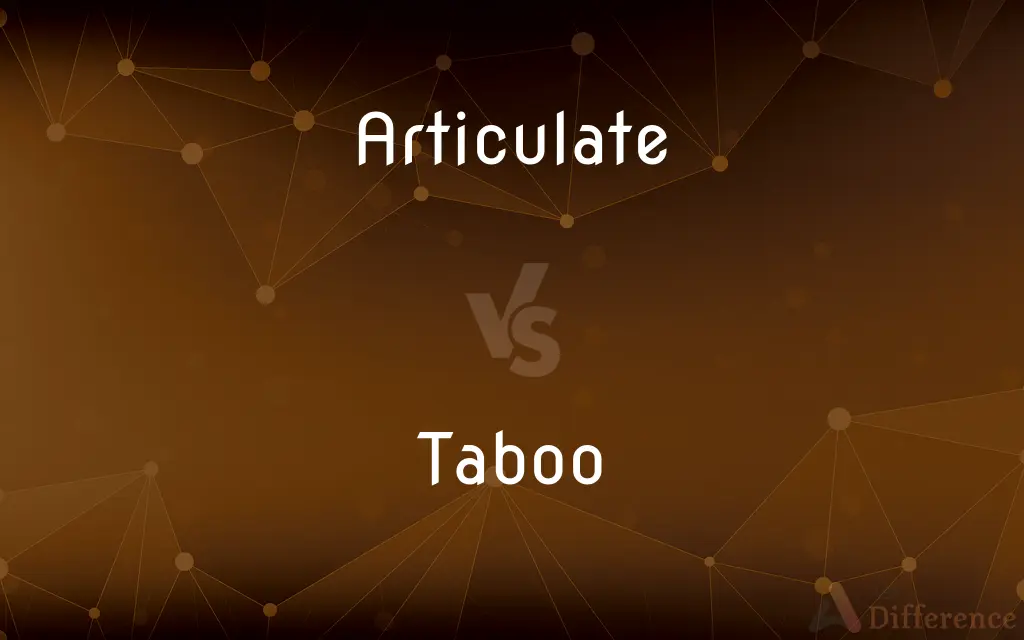Articulate vs. Taboo — What's the Difference?
By Maham Liaqat & Urooj Arif — Updated on April 5, 2024
Articulate involves expressing oneself clearly and effectively, while taboo refers to practices or topics socially prohibited or frowned upon.

Difference Between Articulate and Taboo
Table of Contents
ADVERTISEMENT
Key Differences
Articulate expression is about conveying thoughts, ideas, or feelings in a way that is clear and easy to understand. This involves using language effectively to ensure the intended message is received accurately by the audience. On the other hand, taboo topics or practices are those that are avoided or prohibited by society due to cultural, religious, or social norms. These can range from specific words and phrases to entire subjects of discussion.
While articulate communication aims to facilitate understanding and clarity, engaging with taboo subjects often requires careful navigation to avoid social backlash or offense. Articulate individuals might still choose to address taboos, but they do so in a manner that is sensitive to the audience's perceptions and the potential impact of their words. In contrast, bringing up taboo topics without such consideration can lead to discomfort, misunderstanding, or even ostracism.
The value placed on articulate speech varies across different cultures and settings, being highly prized in academic, professional, and social contexts for its role in effective communication. Conversely, the perception of what is considered taboo can also vary widely between cultures, influenced by historical, religious, and social factors. This contrast highlights how societal norms shape the way we communicate and what we consider acceptable to discuss.
Articulate individuals are often regarded with respect and admiration for their ability to express complex ideas simply and clearly. This skill enhances personal and professional relationships, facilitates learning, and promotes problem-solving. Meanwhile, the violation of taboos, even in articulate ways, can challenge societal norms, sometimes leading to social change but also risking conflict and exclusion.
Despite these differences, both concepts intersect in the realm of public speaking and debate. An articulate speaker who skillfully navigates taboo topics can provoke thought, stimulate discussion, and even alter perceptions, demonstrating the power of well-considered speech in challenging societal boundaries.
ADVERTISEMENT
Comparison Chart
Definition
Clear and effective expression of ideas.
Practices or topics avoided by society.
Purpose
Facilitate understanding and communication.
Maintain social norms and cultural values.
Social Perception
Often viewed positively as a skill.
Generally seen as prohibitive or restrictive.
Context of Use
Valued in diverse settings for clarity.
Varied; depends on cultural, religious, or social norms.
Impact on Society
Promotes learning and problem-solving.
Preserves social cohesion or perpetuates stigma.
Compare with Definitions
Articulate
Able to express ideas clearly and effectively.
The professor's articulate lecture made complex theories accessible.
Taboo
Associated with restrictions based on cultural beliefs.
The taboo against swimming during certain months was strictly observed.
Articulate
The quality of being easily understood.
Articulate instructions helped them complete the project successfully.
Taboo
Considered inappropriate or unacceptable by society.
Breaking the taboo, she spoke openly about her experiences.
Articulate
Skill in using language effectively.
Her articulate speech won the debate.
Taboo
A social or cultural prohibition on certain practices or topics.
In many cultures, discussing money openly is taboo.
Articulate
Being expressive and clear in speech or writing.
He was known for his articulate emails.
Taboo
Subjects or actions avoided due to societal norms.
The book explored taboos surrounding mental health.
Articulate
Communicating with precision and clarity.
Her articulate presentation captured everyone's attention.
Taboo
Involving topics that are off-limits for discussion.
They navigated the conversation carefully to avoid any taboos.
Articulate
Composed of distinct, meaningful syllables or words
Articulate speech.
Taboo
A taboo is an implicit prohibition on something (usually against an utterance or behavior) based on a cultural sense that it is excessively repulsive or, perhaps, too sacred for ordinary people. Such prohibitions are present in virtually all societies.
Articulate
Expressing oneself easily in clear and effective language
An articulate speaker.
Taboo
A social or religious custom prohibiting or restricting a particular practice or forbidding association with a particular person, place, or thing
Freud applies his notion of taboo in three ways
The use of violence must remain a taboo in our society
Many taboos have developed around physical exposure
Articulate
Characterized by the use of clear, expressive language
An articulate essay.
Taboo
Place under a taboo
Traditional societies taboo female handling of food during this period
Articulate
Having the power of speech.
Taboo
A ban or inhibition resulting from social custom or emotional aversion.
Articulate
(Biology) Consisting of sections united by joints; jointed.
Taboo
A prohibition, especially in Polynesia and other South Pacific islands, excluding something from use, approach, or mention because of its sacred and inviolable nature.
Articulate
To pronounce distinctly and carefully; enunciate.
Taboo
An object, word, or act protected by such a prohibition.
Articulate
To utter (a speech sound) by making the necessary movements of the speech organs.
Taboo
Excluded or forbidden from use, approach, or mention
A taboo subject.
Articulate
To express in coherent verbal form
Couldn't articulate my fears.
Taboo
To exclude from use, approach, or mention; place under taboo.
Articulate
To fit together into a coherent whole; unify
A plan to articulate nursing programs throughout the state.
Taboo
An inhibition or ban that results from social custom or emotional aversion.
Articulate
To convert (a student's credits at one school) to credits at another school by comparing the curricula.
Taboo
(in Polynesia) Something which may not be used, approached or mentioned because it is sacred.
Articulate
(Biology) To unite by forming a joint or joints.
Taboo
Excluded or forbidden from use, approach or mention.
Incest is a taboo subject in most soap operas.
Articulate
(Architecture) To give visible or concrete expression to (the composition of structural elements)
A spare design in which windows and doors are barely articulated.
Taboo
Culturally forbidden.
Articulate
To speak clearly and distinctly.
Taboo
To mark as taboo.
Articulate
To utter a speech sound.
Taboo
To ban.
Articulate
(Biology) To form a joint; be jointed
The thighbone articulates with the bones of the hip.
Taboo
To avoid.
Articulate
Clear; effective.
Taboo
A total prohibition of intercourse with, use of, or approach to, a given person or thing under pain of death, - an interdict of religious origin and authority, formerly common in the islands of Polynesia; interdiction.
Articulate
Speaking in a clear and effective manner.
She’s a bright, articulate young woman.
Taboo
To put under taboo; to forbid, or to forbid the use of; to interdict approach to, or use of; as, to taboo the ground set apart as a sanctuary for criminals.
Articulate
Consisting of segments united by joints.
The robot arm was articulate in two directions.
Jointed articulate animals
Taboo
Set apart or sacred by religious custom among certain races of Polynesia, New Zealand, etc., and forbidden to certain persons or uses; hence, prohibited under severe penalties; interdicted; as, food, places, words, customs, etc., may be taboo.
Articulate
Distinctly marked off.
An articulate period in history
Taboo
A prejudice (especially in Polynesia and other South Pacific islands) that prohibits the use or mention of something because of its sacred nature
Articulate
(obsolete) Expressed in articles or in separate items or particulars.
Taboo
An inhibition or ban resulting from social custom or emotional aversion
Articulate
Related to human speech, as distinct from the vocalisation of animals.
Taboo
Declare as sacred and forbidden
Articulate
(zoology) An animal of the subkingdom Articulata.
Taboo
Excluded from use or mention;
Forbidden fruit
In our house dancing and playing cards were out
A taboo subject
Articulate
(transitive) To make clear or effective.
Taboo
Forbidden to profane use especially in South Pacific islands
Articulate
(ambitransitive) To speak clearly; to enunciate.
I wish he’d articulate his words more clearly.
Articulate
(transitive) To explain; to put into words; to make something specific.
I like this painting, but I can’t articulate why.
Articulate
(transitive) To bend or hinge something at intervals, or to allow or build something so that it can bend.
An articulated bus
Articulate
To attack a note, as by tonguing, slurring, bowing, etc.
Articulate that passage heavily.
Articulate
To form a joint or connect by joints
The lower jaw articulates with the skull at the temporomandibular joint.
Articulate
(obsolete) To treat or make terms.
Articulate
Expressed in articles or in separate items or particulars.
Articulate
Jointed; formed with joints; consisting of segments united by joints; as, articulate animals or plants.
Articulate
Distinctly uttered; spoken so as to be intelligible; characterized by division into words and syllables; as, articulate speech, sounds, words.
Total changes of party and articulate opinion.
Articulate
An animal of the subkingdom Articulata.
Articulate
To utter articulate sounds; to utter the elementary sounds of a language; to enunciate; to speak distinctly.
Articulate
To treat or make terms.
Articulate
To join or be connected by articulation.
Articulate
To joint; to unite by means of a joint; to put together with joints or at the joints.
Articulate
To draw up or write in separate articles; to particularize; to specify.
Articulate
To form, as the elementary sounds; to utter in distinct syllables or words; to enunciate; as, to articulate letters or language.
Articulate
To express distinctly; to give utterance to.
Luther articulated himself upon a process that hand already begun in the Christian church.
To . . . articulate the dumb, deep want of the people.
Articulate
Provide with a joint;
The carpenter jointed two pieces of wood
Articulate
Put into words or an expression;
He formulated his concerns to the board of trustees
Articulate
Speak, pronounce, or utter in a certain way;
She pronounces French words in a funny way
I cannot say `zip wire'
Can the child sound out this complicated word?
Articulate
Express or state clearly
Articulate
Expressing yourself easily or characterized by clear expressive language;
Articulate speech
An articulate orator
Articulate beings
Articulate
Consisting of segments held together by joints
Common Curiosities
Why are some topics considered taboo?
Topics are considered taboo due to cultural, religious, or societal norms that dictate what is acceptable to discuss or practice.
Can an articulate person discuss taboos effectively?
Yes, an articulate person can discuss taboos effectively by carefully navigating societal norms and sensitivities.
What does articulate mean?
Articulate refers to the ability to express thoughts, ideas, or feelings clearly and effectively.
How can one become more articulate?
Practice, reading widely, and engaging in thoughtful dialogue can help someone become more articulate.
What is a taboo?
A taboo is a practice or topic that is socially prohibited or frowned upon due to cultural, religious, or social norms.
How do articulate and taboo differ in communication?
Articulate communication enhances understanding and clarity, whereas discussing taboo topics requires caution due to societal restrictions.
Can taboos change over time?
Yes, taboos can change as societal attitudes evolve, with some topics becoming more acceptable to discuss openly.
How does culture affect what is considered articulate or taboo?
Culture influences the standards for articulate communication and what topics or practices are deemed taboo, reflecting societal values and norms.
Is it possible to break a taboo respectfully?
Yes, with careful and sensitive approach, it's possible to address taboo subjects in a way that respects cultural values while promoting dialogue.
How do taboos impact social behavior?
Taboos influence social behavior by setting boundaries on what is considered acceptable, often limiting discussion or practice of certain topics.
Is being articulate always beneficial?
While generally beneficial, being articulate in discussing sensitive or taboo topics requires careful consideration to avoid offense.
Are all taboos universally recognized?
No, what is considered taboo varies widely between different cultures and societies.
Why is articulate expression valued in professional settings?
Articulate expression is valued for its ability to facilitate clear communication, enhance understanding, and promote effective teamwork.
Can discussing taboos lead to social change?
Yes, thoughtfully challenging taboos can lead to social change by opening up dialogue and challenging existing norms.
What skills are important for articulate communication?
Skills such as clarity of thought, a strong vocabulary, and an understanding of the audience are important for articulate communication.
Share Your Discovery

Previous Comparison
Dissimulate vs. Feign
Next Comparison
Buff vs. BoffinAuthor Spotlight
Written by
Maham LiaqatCo-written by
Urooj ArifUrooj is a skilled content writer at Ask Difference, known for her exceptional ability to simplify complex topics into engaging and informative content. With a passion for research and a flair for clear, concise writing, she consistently delivers articles that resonate with our diverse audience.















































